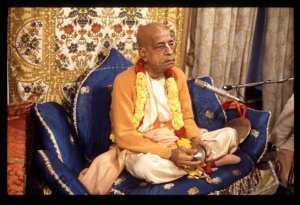CC Antya 5.49-50: Difference between revisions
m (1 revision(s)) |
(Vanibot #0054 edit - transform synonyms into clickable links, which search similar occurrences) |
||
| (One intermediate revision by one other user not shown) | |||
| Line 1: | Line 1: | ||
{{ | [[Category:Sri Caitanya-caritamrta - Antya-lila Chapter 05]] | ||
<div style="float:left">'''[[Sri Caitanya-caritamrta|Śrī Caitanya-caritāmṛta]] - [[CC Antya|Antya-līlā]] - [[CC Antya 5|Chapter 5: How Pradyumna Miśra Received Instructions from Rāmānanda Rāya]]'''</div> | |||
<div style="float:right">[[File:Go-previous.png|link=CC Antya 5.48|Antya-līlā 5.48]] '''[[CC Antya 5.48|Antya-līlā 5.48]] - [[CC Antya 5.51|Antya-līlā 5.51]]''' [[File:Go-next.png|link=CC Antya 5.51|Antya-līlā 5.51]]</div> | |||
{{CompareVersions|CC|Antya 5.49-50|CC 1975|CC 1996}} | |||
{{RandomImage}} | |||
==== TEXTS 49-50 ==== | ==== TEXTS 49-50 ==== | ||
<div | <div class="verse"> | ||
ye śune, ye paḍe, tāṅra phala etādṛśī | :ye śune, ye paḍe, tāṅra phala etādṛśī | ||
sei bhāvāviṣṭa yei seve ahar-niśi | :sei bhāvāviṣṭa yei seve ahar-niśi | ||
tāṅra phala ki kahimu, kahane nā yāya | :tāṅra phala ki kahimu, kahane nā yāya | ||
nitya-siddha sei, prāya-siddha tāṅra kāya | :nitya-siddha sei, prāya-siddha tāṅra kāya | ||
</div> | </div> | ||
| Line 14: | Line 18: | ||
==== SYNONYMS ==== | ==== SYNONYMS ==== | ||
<div | <div class="synonyms"> | ||
ye | ''[//vanipedia.org/wiki/Special:VaniSearch?s=ye&tab=syno_o&ds=1 ye] [//vanipedia.org/wiki/Special:VaniSearch?s=śune&tab=syno_o&ds=1 śune]'' — anyone who hears; ''[//vanipedia.org/wiki/Special:VaniSearch?s=ye&tab=syno_o&ds=1 ye] [//vanipedia.org/wiki/Special:VaniSearch?s=paḍe&tab=syno_o&ds=1 paḍe]'' — anyone who recites; ''[//vanipedia.org/wiki/Special:VaniSearch?s=tāṅra&tab=syno_o&ds=1 tāṅra]'' — of him; ''[//vanipedia.org/wiki/Special:VaniSearch?s=phala&tab=syno_o&ds=1 phala]'' — the result; ''[//vanipedia.org/wiki/Special:VaniSearch?s=etādṛśī&tab=syno_o&ds=1 etādṛśī]'' — this; ''[//vanipedia.org/wiki/Special:VaniSearch?s=sei&tab=syno_o&ds=1 sei]'' — he; ''[//vanipedia.org/wiki/Special:VaniSearch?s=bhāva&tab=syno_o&ds=1 bhāva]-[//vanipedia.org/wiki/Special:VaniSearch?s=āviṣṭa&tab=syno_o&ds=1 āviṣṭa]'' — always absorbed in thoughts of Kṛṣṇa; ''[//vanipedia.org/wiki/Special:VaniSearch?s=yei&tab=syno_o&ds=1 yei] [//vanipedia.org/wiki/Special:VaniSearch?s=seve&tab=syno_o&ds=1 seve]'' — who serves; ''[//vanipedia.org/wiki/Special:VaniSearch?s=ahaḥ&tab=syno_o&ds=1 ahaḥ]-[//vanipedia.org/wiki/Special:VaniSearch?s=niśi&tab=syno_o&ds=1 niśi]'' — day and night; ''[//vanipedia.org/wiki/Special:VaniSearch?s=tāṅra&tab=syno_o&ds=1 tāṅra]'' — his; ''[//vanipedia.org/wiki/Special:VaniSearch?s=phala&tab=syno_o&ds=1 phala]'' — result; ''[//vanipedia.org/wiki/Special:VaniSearch?s=ki&tab=syno_o&ds=1 ki] [//vanipedia.org/wiki/Special:VaniSearch?s=kahimu&tab=syno_o&ds=1 kahimu]'' — what shall I say; ''[//vanipedia.org/wiki/Special:VaniSearch?s=kahane&tab=syno_o&ds=1 kahane] [//vanipedia.org/wiki/Special:VaniSearch?s=nā&tab=syno_o&ds=1 nā] [//vanipedia.org/wiki/Special:VaniSearch?s=yāya&tab=syno_o&ds=1 yāya]'' — it is impossible to express; ''[//vanipedia.org/wiki/Special:VaniSearch?s=nitya&tab=syno_o&ds=1 nitya]-[//vanipedia.org/wiki/Special:VaniSearch?s=siddha&tab=syno_o&ds=1 siddha]'' — eternally liberated; ''[//vanipedia.org/wiki/Special:VaniSearch?s=sei&tab=syno_o&ds=1 sei]'' — such a person; ''[//vanipedia.org/wiki/Special:VaniSearch?s=prāya&tab=syno_o&ds=1 prāya]-[//vanipedia.org/wiki/Special:VaniSearch?s=siddha&tab=syno_o&ds=1 siddha]'' — transcendental; ''[//vanipedia.org/wiki/Special:VaniSearch?s=tāṅra&tab=syno_o&ds=1 tāṅra]'' — his; ''[//vanipedia.org/wiki/Special:VaniSearch?s=kāya&tab=syno_o&ds=1 kāya]'' — body. | ||
</div> | </div> | ||
| Line 21: | Line 25: | ||
==== TRANSLATION ==== | ==== TRANSLATION ==== | ||
<div | <div class="translation"> | ||
"If a transcendentally situated person, following in the footsteps of Śrīla Rūpa Gosvāmī, hears and speaks about the rāsa-līlā dance of Kṛṣṇa and is always absorbed in thoughts of Kṛṣṇa while serving the Lord day and night within his mind, what shall I say about the result? It is so spiritually exalted that it cannot be expressed in words. Such a person is an eternally liberated associate of the Lord, and his body is completely spiritualized. Although he is visible to material eyes, he is spiritually situated, and all his activities are spiritual. By the will of Kṛṣṇa, such a devotee is understood to possess a spiritual body. | |||
</div> | </div> | ||
__NOTOC__ | |||
<div style="float:right; clear:both;">[[File:Go-previous.png|link=CC Antya 5.48|Antya-līlā 5.48]] '''[[CC Antya 5.48|Antya-līlā 5.48]] - [[CC Antya 5.51|Antya-līlā 5.51]]''' [[File:Go-next.png|link=CC Antya 5.51|Antya-līlā 5.51]]</div> | |||
__NOTOC__ | |||
__NOEDITSECTION__ | |||
Latest revision as of 20:41, 19 February 2024

A.C. Bhaktivedanta Swami Prabhupada
TEXTS 49-50
- ye śune, ye paḍe, tāṅra phala etādṛśī
- sei bhāvāviṣṭa yei seve ahar-niśi
- tāṅra phala ki kahimu, kahane nā yāya
- nitya-siddha sei, prāya-siddha tāṅra kāya
SYNONYMS
ye śune — anyone who hears; ye paḍe — anyone who recites; tāṅra — of him; phala — the result; etādṛśī — this; sei — he; bhāva-āviṣṭa — always absorbed in thoughts of Kṛṣṇa; yei seve — who serves; ahaḥ-niśi — day and night; tāṅra — his; phala — result; ki kahimu — what shall I say; kahane nā yāya — it is impossible to express; nitya-siddha — eternally liberated; sei — such a person; prāya-siddha — transcendental; tāṅra — his; kāya — body.
TRANSLATION
"If a transcendentally situated person, following in the footsteps of Śrīla Rūpa Gosvāmī, hears and speaks about the rāsa-līlā dance of Kṛṣṇa and is always absorbed in thoughts of Kṛṣṇa while serving the Lord day and night within his mind, what shall I say about the result? It is so spiritually exalted that it cannot be expressed in words. Such a person is an eternally liberated associate of the Lord, and his body is completely spiritualized. Although he is visible to material eyes, he is spiritually situated, and all his activities are spiritual. By the will of Kṛṣṇa, such a devotee is understood to possess a spiritual body.